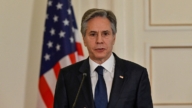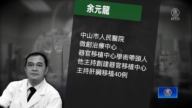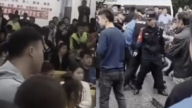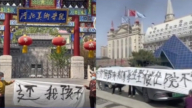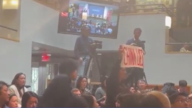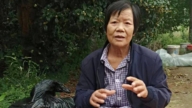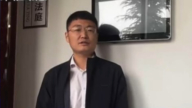【新唐人2011年4月29日訊】過去曾因為華盛頓和北京之間意見分歧,而受到挫折的“美中人權對話”,27號在北京展開兩天,28號已經結束。美方代表助理國務卿波斯納表示,美方關注到中國人權情況有倒退現象,而大陸外交部提出警告,反對(美國)以人權爭議作為“干預中國內政的藉口”。美中分歧似乎仍然難以消彌。
美中最新一輪的人權對話已經結束,美方代表、美國助理國務卿邁克爾.波斯納(Michael Posner)在會後召開記者會。來自《香港電臺》的報導,波斯納說,美方關注到大陸內地人權情況有倒退現象,有維權律師、博客及藝術家被當局禁錮及無故失蹤。會上,他提出了關注維權藝術家艾未未的情況,但他不滿意對方的答復。
波斯納也不認同,中共批評“西方國家利用人權問題,干涉中國內政”的說法。
海外中國民主黨聯合總部主席徐文立,是美中人權對話的受益者,他先後被中共判刑28年,美中人權對話後,他從監獄直接到了美國,但他對人權對話的效果仍表示否定。
徐文立(海外中國民主黨聯合總部主席):“美中人權對話,在目前來看並不能改變中國人權惡化的局面,大家知道,長期以來法輪功受到迫害,並沒有得到中共的認罪和道歉,長期為法輪功學員辯護的高智晟先生至今下落不明,最近我們民主黨人劉賢斌再次被捕、判刑,10年的重刑。”
徐文立還表示,象艾未未這樣典型的案例以外,還有大規模的異議人士和維權律師“被喝茶”、被警告、被限制自由。徐文立認為:目前中國的人權狀況在進一步惡化。
徐文立:“中國政府也簽署了國際人權公約,他有責任履行它的國際義務。但是,從目前來看,它無意改變一黨專制這樣一種政治體制。目前情況是在惡化當中,特別是,專制機器更加黑社會化傾向,需要國際社會的高度關注。”
權利運動人士胡軍也不看好美中人權對話。
胡軍(權利運動人士):“國際上看到中國是一個龐大的市場,在經濟利益上考慮的話,各個國家縱容中共的惡行,他們在某些方面對中共做一些妥協讓步,它們從中獲得一些經濟利益,而真正忽視百姓的生命權利、生存的權利。”
中國人權活動家唐伯橋認為,美國要採取強烈措施才能起到一定效果,否則就沒有必要進行人權對話了。
唐伯橋(中國人權活動家):“據了解,美國至少掌握了5千部級以上中共官員和家人,在瑞士銀行、在美國和全世界各地的資產,具體銀行數目和資產,我想都是為了未雨先籌,為了將來一旦中共翻臉了,或狗急跳牆的時候,美國好有辦法制裁它。”
一年一度的「美中人權對話」從1990年開始,這次的對話是雙方第16次人權對話。在2004年到2008年之間曾經暫停,原因是北京不滿華盛頓支持聯合國人權委員會一項批評中共的決議。上次美中人權對話在去年—-2010年舉行。
新唐人記者常春、宋風、王明宇採訪報導。
2011 U.S.-China Human Rights Dialogue
Differences remain in US-China human rights dialogue
U.S.-China Human Rights Dialogue took place
between April 27 and 28. U.S.
Assistant Secretary of State, Posner said
that the U.S. is concerned about the regress
in China’s human rights situation.
Yet mainland China Ministry of Foreign Affairs
warned the U.S. not to interfere in China’s
internal affairs through human rights issues.
The differences seem hard to dissipate.
The latest round of U.S.-China dialogue
on human rights has ended. After the meeting,
Michael Posner, the U.S. representative and
Assistant Secretary of State, held a press conference.
According to Radio Television Hong Kong,
Posner said the U.S. is concerned of the regress
in human rights situation in mainland China:
lawyers, bloggers, artists have been detained
by the authorities or disappeared without a trace.
He raised concerns about the artist Ai Weiwei,
but was not satisfied by China’s reply.
Posner did not agree with China’s argument
that the “Western countries use human rights
to interfere with China’s internal affairs."
Xu Wenli, Chairman of the Joint Headquarters
of Overseas Chinese Democratic Parties, said that
this is beneficial for the U.S. human rights dialogue.
He had been sentenced for 28 years
in communist China and came directly from prison,
after the U.S.-China Human Rights Dialogue.
Xu Wenli: “At present, U.S.-China Human Rights
Dialogue cannot change the deteriorating
human rights situation in China. We all know,
that the persecution of Falun Gong has been long,
yet Chinese communists did not apologize.
Gao Zhisheng, who had long defended Falun Gong,
is still missing. The Democratic Party member,
Liu Xianbin was recently arrested again
and sentenced to 10 years."
Xu Wenli said that Ai Weiwei is a typical case,
in addition to the large number of dissidents
and human rights lawyers who
“are forced to tea together," warned and restricted.
China’s human rights situation is deteriorating.
Xu: “The Chinese government has signed
international human rights conventions and it has
responsibility to fulfill its international obligations.
But for now, it has no intention to change
the one-party rule system.
The situation is deteriorating. In particular,
the current tendency of the authoritarian machine
to turn into a triad requires international attention."
Human rights activist Hu Jun is not optimistic
about U.S.-China Human Rights Dialogue.
Hu Jun: “The international community sees China
as a huge market, in the word of economic interests,
all countries condoning the evil CCP
(Chinese Communist Party) somehow compromise
with the CCP due to economic benefits,
ignoring people’s normal right to life and existence."
Chinese human rights activist Tang Boqiao said,
the United States needs to take strong measures
in order to play a certain effect, otherwise
there would be no need for human rights dialogue.
Tang Boqiao: “It is understood that the U.S. know
the assets and accounts of at least 5,000 communist
party officials and family members
at a ministry level or above, placed in Swiss banks,
United States banks and around the world.
I think they are getting prepared,
in case the CCP turns hostile or gets cornered,
the United States has the means to sanction them."
The annual U.S.-China Human Rights Dialogue
began in 1990. This year is the 16th dialogue.
It was suspended between 2004 and 2008 after
Beijing was displeased by Washington’s support
of UN Commission on Human Rights’ resolution
criticizing the Chinese communists.
Last U.S.-China Human Rights Dialogue
was held in 2010.
NTD reporters Chang Chun, Song Feng and Wang Mingyu


